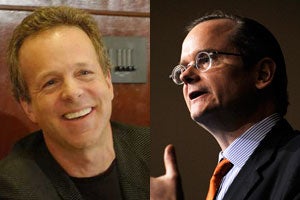The following op-ed, co-written by HLS Professor Lawrence Lessig and Daily Beast contributor Mark McKinnon, appeared in the Apr. 6 edition of the online publication.
How to sober up Washington
by Mark McKinnon and Lawrence Lessig
Washington is hopelessly addicted to money and thus to the status quo; drunk with power and incapable of getting sober and fixing itself. It’s time for an intervention—by the states.
Politically, we two disagree on just about everything. But the one thing we do agree on is that the institutions of government in Washington have become corrupt, held hostage by well-funded special interests. It’s no wonder that only 17 percent of the American public in a recent Gallup survey said they had a favorable opinion of Congress. American voters believe, and rightly so, that corporations, labor unions and moneyed special interests have a chokehold on politicians. Voters are disillusioned and discouraged because they don’t believe Washington represents the will of the people. And the recent Supreme Court decision in Citizens United v. F.E.C.—which permits unlimited independent corporate campaign expenditures—will only make this worse.
And so too many throw up their hands and say, “We give up. Congress won’t fix itself. And there’s nothing that we can do about it.”
But there is something we can do. We, the People, can take back the power we gave to Congress. We can take it back through the states.
The framers left open a path to amendment that doesn’t require the approval of Congress: a convention. Article V of the Constitution requires Congress to call a convention to propose amendments if 34 state legislatures demand it. Any proposed amendment would then have to be ratified by both houses of 38 state legislatures (three-fourths of the states). This entails 76 separate votes in the affirmative by two houses of 38 state legislatures. (Nebraska, with its unicameral legislature, would be an exception.)
Easy to do? No. But possible? Certainly, yes. There hasn’t been a time when there has been such anger and frustration directed at our nation’s capitol. There hasn’t been a moment when the opportunity to organize to build a movement among the states has been as real. The beauty of a convention is that it would provide a forum of possibility for conservative Tea Party types who might want an amendment calling for a balanced budget, or a line-item veto for the president as well as progressives who would like to amend the constitution to make it possible to enact meaningful campaign finance reform. The only requirement is that two-thirds of the states apply, and then begins the drama of an unscripted national convention to debate questions of fundamental law. It would be a grand circus of democracy at its best.
Even if 34 states don’t call for a convention, history teaches that a real threat is often enough to get Congress to act. The only amendment in our history that changed the structure of Congress (the 17th, making the Senate an elected body) was proposed by Congress because the states were close (just one state short) to calling for a convention. If nothing else, the possibility of a body they can’t control is enough to get Congress to pay attention.
Some will resist the idea of a convention because they fear a “runaway” in which fringe elements would take over the agenda and propose radical amendments. But the framers anticipated such a danger and established a very high bar against it. Amendments are ratified by legislatures (or state conventions), not by referenda. And if even one chamber in 12 state legislatures refused to ratify an amendment, it would die. There will always be twelve solid blue states and twelve solid red states in America. There’s thus no danger that one extreme can overtake the other.
Conventional wisdom will argue that constitutional conventions or amendments are just impossible. Just like it was impossible to wrest a republic from the grip of monarchy or abolish slavery. Or impossible to elect Ronald Reagan or Barack Obama. But conventional minds are always wrong about pivotal moments in a nation’s history. And this is a pivotal moment in ours, when a movement to restore democracy is possible.
Indeed, the movement has already begun. Legislators in South Carolina, Virginia, Oregon, Rhode Island and Florida are already throwing sparks that could soon become a brush fire across the country. More and more are coming to see that if reform is necessary—as most all of us, whether from the right or left believe—this is the only way.
Congress has perfected the art of defending the status quo because it is dependent—for its campaign funds—upon the status quo. If we are to break this dependency which holds our nation hostage, we’re not going to do it in Washington. We’ve got to start handing out pitchforks in the states and organize a national convention. From there we will scale the federal ramparts and regain some sense and accountability.
